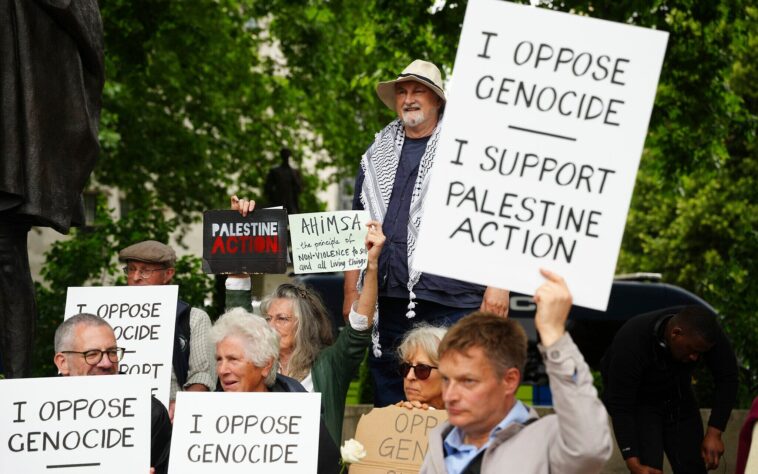This past weekend, the United Kingdom saw widespread arrests as individuals voiced their support for a forbidden Palestinian advocacy organization. Protests erupted, stretching into their third consecutive weekend, in reaction to the government’s recent decision to outlaw the group. Protesters waved banners with messages such as ‘I oppose genocide, I support Palestine Action,’ as they convened across major cities like London, Manchester, Edinburgh, Bristol, Londonderry and Truro.
The chain of events were triggered by the government’s censoring of Palestine Action after its activists trespassed onto a Royal Air Force installation at Brize Norton in Oxfordshire. Staged on June 20, the protest targeted the UK’s military aid to Israel in its clash with Hamas. The activists marked their dissent by spraying red paint onto the jet engines of two military aircraft and causing additional damage using crowbars.
The outrage over the actions of activists incited British Parliament to enact new regulations this month. They deemed Palestine Action a terroristic entity. Consequently, affiliation with the group, or lending support to its initiatives, could now incur a penalty of up to 14 years of imprisonment.
Amid the protests, police enhanced their presence within the heart of London. Equipped to uphold the rights to peaceful demonstrations, they warned swift action against any unlawful activities by protestors. This enforced vigilance came as a response to the potential violation of laws during the protest.
The law enforcement ban faces legal opposition from the supporters of Palestine Action. The fate of the prohibition will soon be debated in the High Court of London. As stated by the activist coalition ‘Defend Our Juries’, the court’s consideration of the case is slated for Monday.
On Saturday, the large-scale protests drove law enforcement into action across the nation, resulting in approximately a hundred arrests. More than half of these, 55 to be exact, transpired in London. The demonstrations also led to a face-off between the police and protestors at various significant locations.
In the capital city of London, law enforcement encircled protestors gathered near the statue of Mahatma Gandhi, located at a stone’s throw from the Houses of Parliament. This plaza turned into a site where officers seized placards and inspected the bags of those apprehended.
Supporters of Palestine Action have expressed their dissent and defiance in the face of state crackdown. Their protests coalescing into a ripple effect across the nation signals the beginning of what could be a lengthy legal battle. The drive for their voice to be heard has resulted in widespread arrests, thus drawing even more attention to their cause.
Saturday’s events saw moments of intense confrontations between law enforcement and protestors. In one instance caught in a video shared on the internet, police officers led away an elderly protestor from the crowd in Truro, a city in Cornwall. The aging demonstrator made his opposition known by shouting, ‘I oppose genocide.’
As nations globally observe the ongoing struggle over Palestine Action, the UK stands at a precipice of civil unrest. The ramifications of the escalating confrontations between law enforcement and protestors remain to be seen. Amid these proceedings, advocates and human rights organizations wait with bated breath for the outcome of the High Court hearing.
The fusion of politics, protest, and law enforcement has created a turbulent scenario in the UK. The country’s legislation and its handling of protests have put it under the microscope on a global stage. However, no clear endgame is in sight as the legal push and pull continues.
While the government stands firm on its decision, maintaining that the measures taken are in line with national security concerns, the supporters of Palestine Action continue their fight for what they perceive as their right to free speech and peaceful protest.
Going forward, how the British government navigates this delicate issue could set the precedent for how protests in support of overseas political movements are managed in the future. As the tug-of-war between the government and the protestors continues, all eyes are on the High Court’s decision, which could potentially change the course of this conflict.

